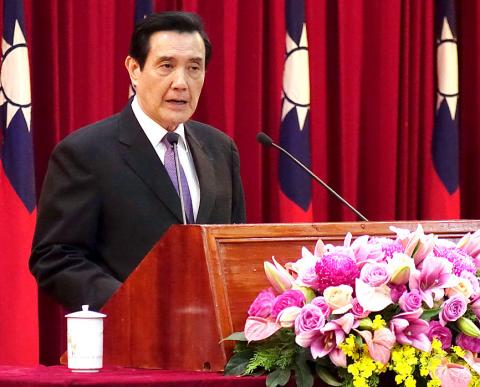The government yesterday reiterated its demand that Tokyo issue an apology to Taiwanese women who were forced into sexual slavery by the Japanese military during World War II, euphemistically known as “comfort women,” and to offer them compensation.
“The Republic of China has always said that Japan should apologize to Taiwanese comfort women and offer them compensation,” President Ma Ying-jeou (馬英九) said at a ceremony to promote military officers, adding that the government’s stance has never changed.
Later in the day, Ma asked Representative to Japan Shen Ssu-tsun (沈斯淳) to conduct immediate negotiations with the Japanese government and demand that Tokyo give Taiwanese comfort women the same treatment it offered South Korean victims, Presidential Office spokesman Charles Chen (陳以信) said.

Photo: Wang Min-wei, Taipei Times
Ma’s appeal came a day after Japan and South Korea reached a deal in Seoul, under which Japan agreed to apologize and give about ¥1 billion (US$8.3 million) to a foundation set up by the South Korean government for comfort women.
Japanese Prime Minister Shinzo Abe issued an apology to the comfort women later on Monday on behalf of his country.
Chen said Ma has expressed concern about the issue since serving as minister of justice two decades ago.
Since taking office in May 2008, Ma has paid five visits to some of the surviving Taiwanese comfort women and held three meetings with them at the Presidential Office, Chen added.
Ma said that in August he expressed the hope that Tokyo would “do more and do better” in dealing with its World War II legacy, especially on the issue of comfort women, after Abe expressed remorse for Japan’s wartime aggression in a speech marking the 70th anniversary of the war’s end.
Soon after news of the Seoul deal surfaced on Monday, Taiwan asked Japan to respond positively to Taiwan’s demands over the comfort women issue.
Minister of Foreign Affairs David Lin (林永樂) said at a separate news conference yesterday that Taiwan’s representative office would continue to negotiate with the Japanese government over the issue.
Taiwan would also closely watch the developments following the Japan-South Korea deal, he said.
In 1992, the government set up a cross-agency task force to tackle comfort women-related issues, and Lin said he hoped the task force could meet again to present clear parameters for the nation’s appeal, including a method of compensation that would be acceptable to all parties.
According to the Taipei Women’s Rescue Foundation, which offers assistance to Taiwanese comfort women, about 2,000 Taiwanese were forced into becoming sex slaves during World War II.
A total of 58 have come forward to ask for compensation and demand a formal apology from Japan; only four are still alive, it said.
Despite the foundation’s repeated calls for an apology and compensation for the comfort women in its annual protests, Japan has never given them a positive response.
With the assistance of the foundation, a group of Taiwanese comfort women filed a lawsuit in Tokyo against the Japanese government, but they lost in 2005.

CHAOS: Iranians took to the streets playing celebratory music after reports of Khamenei’s death on Saturday, while mourners also gathered in Tehran yesterday Iranian Supreme Leader Ayatollah Ali Khamenei was killed in a major attack on Iran launched by Israel and the US, throwing the future of the Islamic republic into doubt and raising the risk of regional instability. Iranian state television and the state-run IRNA news agency announced the 86-year-old’s death early yesterday. US President Donald Trump said it gave Iranians their “greatest chance” to “take back” their country. The announcements came after a joint US and Israeli aerial bombardment that targeted Iranian military and governmental sites. Trump said the “heavy and pinpoint bombing” would continue through the week or as long

TRUST: The KMT said it respected the US’ timing and considerations, and hoped it would continue to honor its commitments to helping Taiwan bolster its defenses and deterrence US President Donald Trump is delaying a multibillion-dollar arms sale to Taiwan to ensure his visit to Beijing is successful, a New York Times report said. The weapons sales package has stalled in the US Department of State, the report said, citing US officials it did not identify. The White House has told agencies not to push forward ahead of Trump’s meeting with Chinese President Xi Jinping (習近平), it said. The two last month held a phone call to discuss trade and geopolitical flashpoints ahead of the summit. Xi raised the Taiwan issue and urged the US to handle arms sales to

BIG SPENDERS: Foreign investors bought the most Taiwan equities since 2005, signaling confidence that an AI boom would continue to benefit chipmakers Taiwan Semiconductor Manufacturing Co’s (TSMC, 台積電) market capitalization swelled to US$2 trillion for the first time following a 4.25 percent rally in its American depositary receipts (ADR) overnight, putting the world’s biggest contract chipmaker sixth on the list of the world’s biggest companies by market capitalization, just behind Amazon.com Inc. The site CompaniesMarketcap.com ranked TSMC ahead of Saudi Aramco and Meta Platforms Inc. The Taiwanese company’s ADRs on Tuesday surged to US$385.75 on the New York Stock Exchange, as strong demand for artificial intelligence (AI) applications led to chip supply constraints and boost revenue growth to record-breaking levels. Each TSMC ADR represents

State-run CPC Corp, Taiwan (CPC, 台灣中油) yesterday said that it had confirmed on Saturday night with its liquefied natural gas (LNG) and crude oil suppliers that shipments are proceeding as scheduled and that domestic supplies remain unaffected. The CPC yesterday announced the gasoline and diesel prices will rise by NT$0.2 and NT$0.4 per liter, respectively, starting Monday, citing Middle East tensions and blizzards in the eastern United States. CPC also iterated it has been reducing the proportion of crude oil imports from the Middle East and diversifying its supply sources in the past few years in response to geopolitical risks, expanding